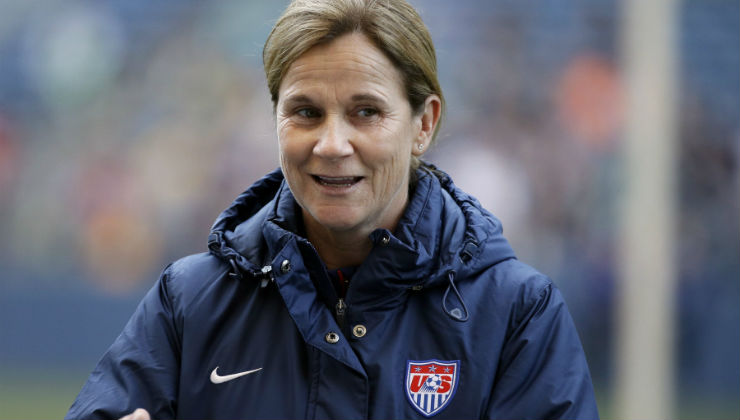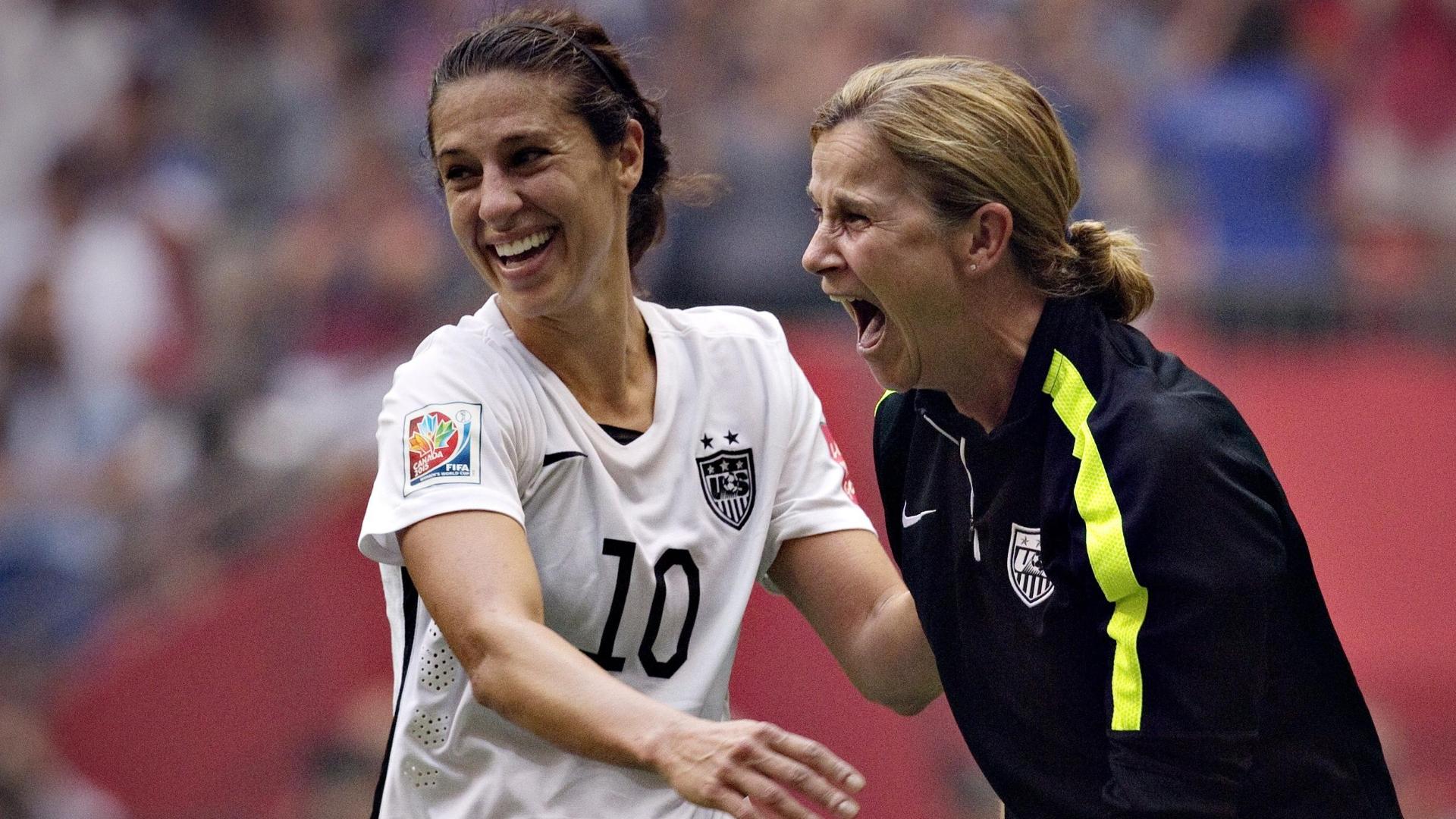Q&A With USWNT Head Coach Jill Ellis

Photo credit: Elaine Thompson/Associated Press​
The United States women’s national team once again reached the pinnacle of soccer by winning the World Cup in 2015. The team was guided by Jill Ellis, who was appointed to the role in May of 2014. Ellis was also named the 2015 World Coach of the Year for Women’s Soccer by FIFA, following the U.S.’s defeat of Japan, 5-2. Ellis spoke to Matthew Levine of NASL.com about being a World Cup Champion, pushing on for an Olympic gold medal in Rio this summer, and more.
Levine: First off, what’s it like to be a World Cup Champion?
Ellis: It’s good. It’s certainly something you don’t take lightly and it’s a huge privilege. It’s great. I think what’s exciting now is what we can continue to do with the team, continue to grow with not just the players we have now, but the players we’re looking at for the next World Cup. It’s been a wonderful eight, nine months, but from January our focus has shifted to what’s in front of us.
Levine: Since the World Cup there has been a changing of the guard a little bit with newer and younger players coming in. How smooth or difficult has the transition been?
Ellis: You’re right. I think it was something we knew certain players would probably be retiring and there were players that are going to have children. I think it’s part of the natural evolution, especially after a world event, a lot of players see that as the catalyst and step away.
For me and my staff it’s exciting. I have kept tabs on a lot of the players in our youth teams and a lot of younger players that have done well in the league, so to now give those players an opportunity and test them in this environment has been great. The players that are on board, in terms of the veterans, have been very open and receptive and embracing this. What they ultimately recognize is that if a player is good enough to help them win they are going to recognize them as being an important part of the team.
It’s been a really smooth transition in terms of the social integration and the chemistry. When you bring in new players you get a different energy. It’s all been very, very positive. I really have focused on players right now that can help us for 2019, so it’s not just about players that can help for the Olympics. It’s really about building for beyond that.
We’ve been bringing players in that have done well or shown well and assessing them in here because it’s one thing to do well in your environment – a youth national team or NWSL – but it’s very different to come into this environment and do well. It’s a tough environment to be successful. The ones we’ve brought in have done really well.
Levine: How has your coaching of some of the youth teams helped now that a lot of the players that you’ve built relationships with prior to will now fill those roles?
Ellis: It’s partly the players I was already aware of having worked with the youth teams, but an important part of this was to bring national team coaches into our environment – U-17, U-20, U-22 coaches – because ultimately the coaches that are going to grow and develop players need to know what the top end looks like and what the demands are of that environment. Having them know, not just our needs positionally, but the mentality piece in that environment, the technical and tactical demands of the environment has made it really smooth.
An example was we were in camp and I needed an extra player to train with us. Michelle French had our U-20s in with us and I called her and said ‘I need a center back.’ She knew immediately what kind of player and the player did very well. That integration and transparency between the teams is critical for our success because it’s all about the pipeline.
Levine: The next big tournament is the Olympics and it’s a tournament the U.S. has won before, but how do you take the squad from the highest of highs and get their feet back to the ground?
Ellis: It’s about setting the expectation. In our opening meeting in January I challenged them and said no team has won the Olympics after winning the World Cup back-to-back. It’s also reminding them about getting to the summit of something. You don’t dwell and hang out on summits. You get up, enjoy it briefly, and move on. That’s part of the mindset of the elite player in this environment. You’re looking for the next challenge and part of our job as coaches is to make sure we aren’t dwelling.
What I said at the beginning of camp was that where we are today won’t be good enough to win in eight months. We have to continue to push and evolve and that’s really been the messaging. Everybody right now is gunning for the team that won the World Cup, so if we can be a better and different team at the Olympics it makes us harder to beat.
It’s been great. The players are excited and I think when you have new players in that haven’t experienced a world event like the Olympics it adds to the excitement and energy to the squad.

Photo credit: ESPN.com
Levine: How honored were you when you were named the 2015 World Coach of the Year for Women’s Soccer by FIFA?
Ellis: It was a tremendous honor. When I accepted it I acknowledged it’s not an individual award, it’s a combination of a large, amazing staff and players. While it was a tremendous honor I embraced it with the staff and players, but it was fantastic.
Levine: It’s a big year in the NWSL with its longevity reaching further than other women’s leagues in the past. What role has that been playing or will it play for you as the national team?
Ellis: For the NWSL I know last year coming off the World Cup many teams got a bump in attendance, which is fantastic because the more people we can expose to the level of play these women put on, the more fans they’ll gain.
In terms of the position as the full national team coach having this platform is essential. It gives our players potentially that haven’t reached their top end an environment to play and compete in. We have some of the best players in the world now in this league.
In terms of the success and longevity of a professional league, I think it’s critical for the women’s national team. My staff and I have been very supportive and we’ve tried to facilitate certain things that we can help with the league. Sport scientists have been hired to travel around with the teams. Every team has been given heart rate and GPS monitors to make sure they have the access that we have [at the national team]. It’s a good partnership with the league.
Levine: In more general terms of soccer in this country, not just the NWSL or the support of the women’s team, but on the men’s side as well with leagues like the NASL, how does that help you and the national team down the line?
Ellis: The growth of the game across both genders I think is fantastic for our sport. People say soccer is up and coming, but soccer is here and here to stay. Fan bases are getting more and more educated about the sport. I think people are attracted to our game.
The popularity of our sport is helpful in terms of what we’re trying to do. The ultimate kickback for us is if people get inspired by watching our teams play and little girls and boys want to kick around the soccer ball. That’s the pay back in terms of growing the game we’re looking for.
The success of any league and any platform in our country is obviously a success for us and something we’re all pulling for.
Levine: With the Olympics coming soon, what would it be like to be the coach that wins both the World Cup and also claim a gold medal in the Olympics?
Ellis: It would be an understatement to say it’d be amazing. I think, right now, where I’m at with the team we’re very focused on putting all the pieces in place. While we always have one eye on being at the top of the podium, right now it’s maximizing everything between now and six months to be ready for that moment.
I always feel prepared and it gives us confidence. I know the players will be prepared. The level of competition we brought this year to the U.S. will be helpful embedding some of the younger players and having them see the level.
It would be an amazing combination of two, three years from our staff and players.

